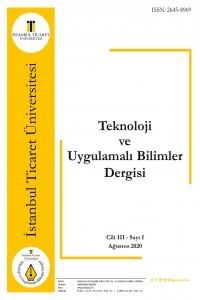İYİLEŞTİRİLMİŞ OTOMATİK ANAHTAR KELİME ÇIKARIMI BRAKE
Ayrıca, çalışmalar yazar tarafından atanan anahtar kelimelerin 19%'unun makaleye dahil olmadığını göstermiştir Kim vd., 2010 . Bu nedenlerden dolayı, veri madenciliğinin bir dalı olan verilerin otomatik olarak çıkarılması giderek önem kazanmakta ve otomatik anahtar kelime çıkarma algoritmaları ile bu problem yüksek oranda aşılabilmektedir
Anahtar Kelimeler:
Anahtar kelime çıkarımı, BRAKE, RAKE, TF-IDF
Brake: Better Rapid Automated Keyword Extraction
Keywords and keyphrases facilitate the analysis of a large number of textual materials and allow quick and easy access to the desired information. Automatic keyword algorithms can be used to extract these data. Automatic keyword extraction algorithms; We can define it as extracting the most explicit words or phrases that appear in a text in a particular algorithm. Algorithms such as TD-IDF and RAKE, which are two of the most common algorithms, are used in these algorithms. It is aimed to produce meaningful key words from texts with high entropy value.
Keywords:
BRAKE, keyword extraction, RAKE, TF-IDF,
___
Adji, T. B., Abidin, Z., & Nugroho, H. A. (2014), System of negative indonesian website detection using tf-idf and vector space model. In 2014 International Conference on Electrical Engineering and Computer Science (ICEECS), 174–178.Beliga, S. (2014). Keyword extraction: a review of methods and approaches.
Bharti, S. K., & Babu, K. S. (2017). Automatic keyword extraction for text summarization: A survey. CoRR, http://arxiv.org/abs/1704.03242
Chien, L. F. (1997). Pat-tree-based keyword extraction for chinese information retrieval. Research and Development in Information Retrieval, 20th Annual International ACM SIGIR Conference, SIGIR ’97 New York, (pp. 50-58).
Ercan, G., & Cicekli, I. (2007). Using lexical chains for keyword extraction. Inf. Process. Manage., 43(6), 1705– 1714.
Guan, J. (2016). A study of the use of keyword and keyphrase extraction techniques for answering biomedical questions. A thesis submitted to Macquarie University for the degree of Master of Research Department of Computing.
Hulth, A. (2003). Improved automatic keyword extraction given more linguistic knowledge. In Proceedings of the 2003 Conference on Empirical Methods in Natural Language Processing, EMNLP ’03 Stroudsburg, PA, USA: Association for Computational Linguistics, (pp. 216–223).
Jing, L. P., Huang, H. K. & Shi, H. B. (2002). Improved feature selection approach tfidf in text mining. In proceedings, International conference on machine learning and cybernetics, Beijing, China, 2, 944–946.
Kim, S. N., Medelyan, O., Kan, M. Y., & Baldwin, T. (2010). Semeval-2010 Task 5: Automatic keyphrase extraction from scientific articles. In Proceedings of the 5th International Workshop on Semantic Evaluation
SemEval’10 Stroudsburg, PA, USA: Association for Computational Linguistics, (pp. 21–26). Luhn, H. P. (1957). A statistical approach to mechanized encoding and searching of literary information. IBM Journal of Research and Development, 1(4), 309–317.
Leung, A. (2016). Evaluating automatic keyword extraction for internet reviews. Unıversıty Of Lorraıne Realself INC.
Medelyan, O., & Witten, I. H. (2006). Thesaurus based automatic keyphrase indexing. In Proceedings of the 6th ACM/IEEE-CS Joint Conference on Digital Libraries, JCDL ’06 New York, NY, USA: ACM, (pp. 296-297).
Rose, S., Engel, D., Cramer, N., & Cowley, W. (2010). Automatic keyword extraction from individual documents. Text Mining: Applications and Theory, pp. 1–20.
Siddiqi, A. S. S. (2015). Keyword and keyphrase extraction techniques: A literature review. International Journal of Computer Applications, 109(2), 1–6.
Turney, P. D. (2002). Extraction of keyphrases from text: Evaluation of four algorithms. CoRR, http://arxiv.org/abs/cs.LG/0212014
Zhang, K., Xu, H., Tang, J., & Li, J. Z. (2006). Keyword extraction using support vector machine. 1, 85–96.
- Yayın Aralığı: Yılda 2 Sayı
- Başlangıç: 2018
- Yayıncı: İstanbul Ticaret Üniversitesi
Sayıdaki Diğer Makaleler
İMAR BARIŞI’NIN GETİRDİKLERİ VE YAŞANABİLECEK AKSAKLIKLAR
Mustafa Hakan ÖZELMACIKLI, İbrahim BAZ
Tuğba VATAN, Vahit Ferhan BENLİ
GAYRİMENKUL SEKTÖRÜNDE DİJİTAL PAZARLAMADA ARAMA MOTORLARI REKLAMLARI
HİZMETLER SEKTÖRÜNE DÖNÜŞÜM SÜRECİNDE İSTANBUL’UN DEĞERLENDİRİLMESİ
Gökhan Işık TÜTENK, İbrahim BAZ
İSTANBUL’DAKİ PAYLAŞIMLI OFİS ALANLARININ SUNDUKLARI HİZMETLER VE TASARIM ÖZELLİKLERİ
Eda ÖZTÜRK, Elif Kısar KORAMAZ
İYİLEŞTİRİLMİŞ OTOMATİK ANAHTAR KELİME ÇIKARIMI BRAKE
Sina Ahmet BİRDEVRİM, Ali BOYACI, Dena Ahmed S. Al THANİ
ARAÇSAL AĞLARIN AFET SENARYOLARINDAKİ PERFORMANSLARININ KARŞILAŞTIRILMASI
